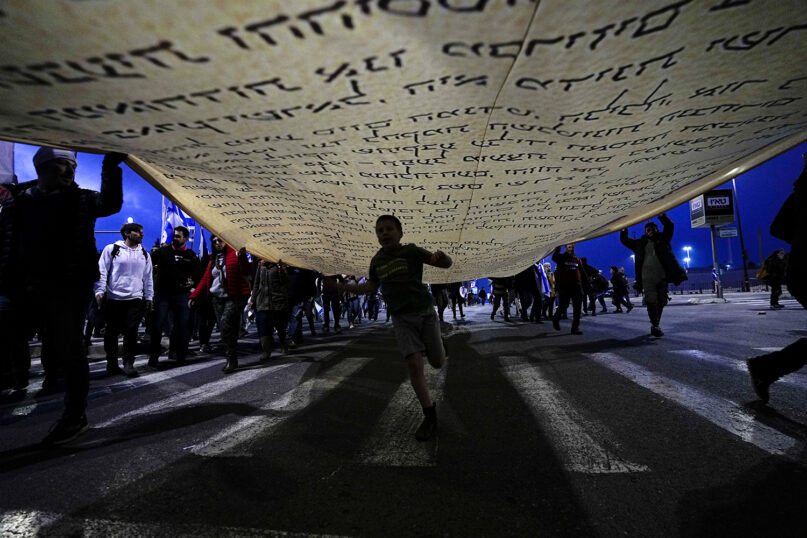(RNS) — On the same day Israel’s government advanced legislation to overhaul the country’s judicial system, a group of liberal Jewish organizations marched in protest outside the Israeli Consulate in New York.
The aim of the protest, led by T’ruah, a rabbinic human rights organization, was to join in solidarity with Israelis who have taken to the streets en masse to demonstrate against the legislation forwarded by Prime Minister Benjamin Netanyahu’s governing coalition.
On Tuesday (Feb. 21), Israel’s parliament, called the Knesset, voted 63-47 to advance legislation giving the coalition more power to appoint Israel’s Supreme Court judges. The bill needs two more hearings in the Knesset before final passage. But given the first vote, it would appear to have the necessary support to pass.
If enacted, it would give the coalition full control over the appointment of judges and would bar the Supreme Court from striking down basic laws.
“The idea is to be in solidarity with hundreds and thousands of Israelis protesting against the massive attacks on democracy,” said Rabbi Jill Jacobs, CEO of T’ruah: The Rabbinic Call for Human Rights, which has 2,300 member rabbis and cantors.
RELATED: Outrage over far-right Israeli government has American Jewish leaders stewing
Jacobs’ group was joined by members of the Progressive Israel Network, a 12-member alliance of U.S. Jewish groups, including two smaller Jewish denominations, Reconstructing Judaism and the Jewish Renewal movement, called Aleph.
Outrage over Israel’s government and its anti-democratic leanings extends also to the two largest Jewish denominations, the Conservative and Reform movements, both of which have issued statements expressing their alarm over the new government’s actions.
Tens of thousands of protesters gathered around the Knesset in Jerusalem on Monday, blocking highways to the city as convoys of people arrived from across the country to demonstrate.
The far smaller rally on Second Avenue across the street from Israel’s New York consulate was attended by a few hundred. Unlike the Israeli rallies, it was also intended to draw attention to Israeli government plans to deepen settlement expansion and occupation in the West Bank. Far fewer Israelis are protesting that.
On Monday, the United Nations Security Council adopted a statement expressing its “deep concern and dismay over Israel’s recent announcement of further construction and expansion of settlements in the Occupied Palestinian Territory, as well as the ‘legalization’ of settlement outposts.”
The statement was welcomed by J Street, a group pushing for a two-state solution to the Palestinian conflict, which called the U.N.’s letter “an important rebuke.”
Some have questioned whether the U.S. Jewish groups’ statements and protests go far enough — suggesting their gentle admonitions of Israel’s authoritarian leanings are toothless. Few, for example, are willing to support conditioning U.S. aid to Israel on a promise that it would not use the money to expand settlement construction in the West Bank.
But in the face of growing disaffection for Israel among younger U.S. Jews who are increasingly siding with Palestinians, these progressive groups said action is required.
“There are American Jews who feel like the only answer is to walk away from Israel,” said Jacobs. But she added, “When you walk away you create a vacuum for people to walk in and create their own fantasy of a fascist theocracy.”
In addition to J Street, Tuesday’s rally included members of the New Israel Fund, a group that raises about $30 million for Israel annually, which it awards to civil society groups that advance democracy in Israel.
“We’re less engaged in government advocacy and American foreign policy toward Israel,” said Libby Lenkinski, vice president for public engagement at the New Israel Fund. “But today the picture is so stark and looks so dark for people who believe in a democratic future for all people living under Israel’s control, we think people are experiencing the severity of this moment in a new way. “
RELATED: Critics say Israeli judicial reform would end checks on Orthodox Jewish establishment





